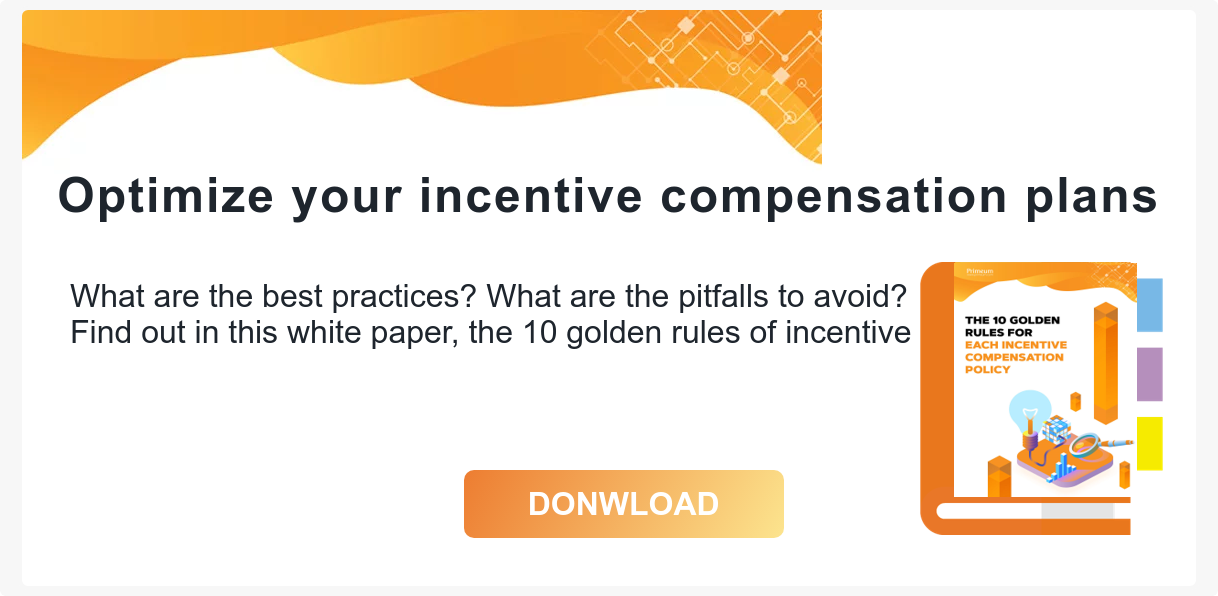«If in B2C, a bonus represents 20% to 25% of total compensation and can reach 50% in B2B, its aim is primarily to ensure short-term salespeople invest and are involved, and are loyal in the long term » – extract from a Maesina International Search study, article on actionco.fr
According to the definition in the French Larousse dictionary, an efficient individual produces maximum results with minimum effort or means. This person therefore has good performance and is efficient in their assignments. Companies are looking for more commercial performance and are more than willing to implement strategies that enhance commercial efficiency. What are the factors that make salespeople more efficient? Can incentive compensation be one of them? By what means?
This article contains some answers.
What is the link between efficiency and motivation?
According to a recent study by management consulting company Gallup, 72% of motivated employees believe they can have a positive influence on customer service.
A motivated employee is not necessarily efficient
An efficient person can produce more, more quickly than others in the same situation. By maintaining a certain level of quality and having the same initial level of resources, an efficient employee will attain their objectives more easily. Efficient people can generally achieve their goals more quickly with less effort and with the means available to them. Some managers wrongly tend to draw a direct parallel between motivation and efficiency.
Common sense dictates that a motivated person is by nature more efficient than an employee who is disinterested in their work. Undeniably, a motivated person will accomplish their tasks with more conviction, but will they be more efficient?
Not necessarily. It is therefore important to separate the notion of motivation from that of efficiency. A highly motivated employee is not necessarily a very efficient employee. However, working hard and with conviction does not mean working efficiently. That said, in some cases, motivation can be a source of efficiency, provided it is well managed.
How do you transform motivation into efficiency?
In light of the above, offering an incentive compensation system according to whether qualitative objectives are achieved can show your motivated employees the path to efficiency. The goal is to show employees the path to performance by showing them, step by step, what to do to achieve greater individual efficiency. It is worth offering them qualitative indicators for monitoring their work.
For instance, they could be qualitatively encouraged to carry out a minimum of 10 customer appointments a week and to make 50 customer calls a week to show them the path to efficiency. With this arrangement, the salesperson is objectively assessed in terms of qualitative indicators which indicate the way to progress.
This concrete action plan will boost the quality of the salesperson’s day-to-day work and increase their efficiency. The second goal is to get the sales representative to improve as they meet with clients, thereby achieving their sales objectives and ultimately increasing their incentive compensation.
In this way, incentive compensation is an important motivation tool for employees, provided that it is managed efficiently using qualitative indicators showing the path to success for everyone.
The concept of efficiency applied to trade: commercial efficiency
“There is no such thing as an impregnable fortress. There are only badly carried out attacks,” Vauban, Marshal of France and French military engineer.
Business efficiency stems from business strategy
Business efficiency is the ability of a business, department or individual to achieve goals and expected results. The concept of commercial efficiency thus brings together the issues of costs, deadlines, quality and even profitability. How do you know if an employee is efficient from a business point of view?
Commercial efficiency is measured using KPIs (key performance indicators), which are qualitative and/or quantitative. First of all, it is important to take into account the sector of activity in which the company operates, the economic context, seasonality or the strength of competition in the market to correctly understand the KPIs related to business efficiency.
Does the company offer products or services? Does its range of services mean it can consider operating in new markets? Does the company have enough trained and competent salespeople who can develop the existing customer base? Does the company know enough about its customers and their needs? How well does it anticipate and meet its customers’ expectations? Does the company have a real competitive advantage? How good is its sales pitch etc? All of these are relevant considerations when it comes to assessing a company’s commercial efficiency and can be used to assess the individual performance of each employee.
Business efficiency consequently reflects an organisation’s capacity to achieve its sales goals. From this perspective, what is the link between commercial efficiency and incentive compensation? How can incentive compensation boost the efficiency of salespeople?
Putting salespeople on the path to performance thanks to qualitative indicators
“Most companies are still very conventional in terms of their incentive compensation policy and focus primarily on quantitative aspects. Salespeople are first and foremost there to sell: it is their job,” says Cyril Bregou, founder and managing partner of the consultancy firm People Base in an article on actionco.fr. More and more companies understand the importance of guiding salespeople in their quest for performance. To help them take the right steps, companies are interested in introducing more qualitative elements in their evaluation grids.
Although some companies still very much favour quantitative evaluation criteria, many of them want to guide sales teams towards higher quality. However, the role of qualitative criteria should not be contrasted with purely quantitative ones. In both cases, the role of incentive compensation, whether based on solely qualitative or on the contrary solely quantitative criteria, is to achieve greater commercial efficiency and greater individual and/or collective performance.
Helping salespeople attain greater efficiency and performance therefore requires an incentive compensation system to be established which strikes a balance between quantitative and qualitative criteria! You can read our article on setting up a qualitative bonus.





